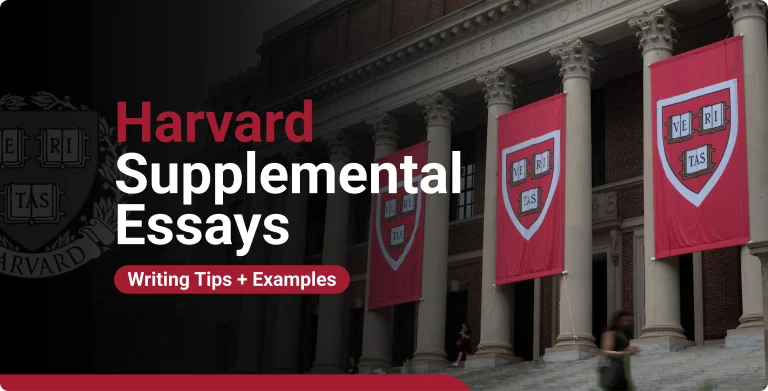Harvard University asks you to write five supplemental essays, each capped at 150 words. They’re short, sure, but don’t underestimate them—these essays are your shot at standing out in one of the most cutthroat applicant pools out there. With an acceptance rate of only 3.6% for the Class of 2028, Harvard needs more than perfect grades or sky-high test scores. Harvard wants to see the real you—authentic, thoughtful, and in sync with their values.
So, what’s the game plan? In this blog, we’re diving into each of Harvard’s supplemental essay prompts. We’ll break down what they’re really asking, how to brainstorm ideas that don’t sound like everyone else’s, and how to write responses that actually sound like you. Let’s make those essays unforgettable.
- Harvard Supplemental Essay Prompts
- How to Write the Harvard Supplemental Essay #1
- How to Write the Harvard Supplemental Essay #2
- How to Write the Harvard Supplemental Essay #3
- How to Write the Harvard Supplemental Essay #4
- How to Write the Harvard Supplemental Essay #5
- Mistakes to Avoid When Writing Harvard Supplemental Essays
- Frequently Asked Questions
- Takeaways
Harvard Supplemental Essay Prompts
Along with your personal statement for the Common App or Coalition App, you’ll need to tackle five Harvard-specific essays. Here are the Harvard supplemental essay prompts for 2024-2025:
- Harvard has long recognized the importance of enrolling a diverse student body. How will the life experiences that shape who you are today enable you to contribute to Harvard? (max 150 words)
- Describe a time when you strongly disagreed with someone about an idea or issue. How did you communicate or engage with this person? What did you learn from this experience? (max 150 words)
- Briefly describe any of your extracurricular activities, employment experience, travel, or family responsibilities that have shaped who you are. (max 150 words)
- How do you hope to use your Harvard education in the future? (max 150 words)
- Top 3 things your roommates might like to know about you. (max 150 words)
Think of these as your chance to show off parts of yourself that didn’t make it into your main essay. Harvard suggests keeping these responses tight, ideally between 100-150 words. No fluff, no rambling. You’ve got to answer all five prompts, no skipping.
Every supplemental essay has a specific purpose, so tailoring your response is non-negotiable. These prompts are Harvard’s way of gauging how self-aware you are, how well you communicate, and how much you align with what they value. The key is striking a balance: stay authentic, but be smart about what you highlight.
Up next, we’ll dig into each prompt, break down what they’re really asking, and give you some solid tips to craft Harvard supplemental essays that actually work.
How to Write the Harvard Supplemental Essay #1
| Prompt: Harvard has long recognized the importance of enrolling a diverse student body. How will the life experiences that shape who you are today enable you to contribute to Harvard? |
| Word count: Max 150 words |
The Harvard supplemental essay prompt #1 is all about digging into your background and experiences. Harvard’s big on diversity, and not just the obvious stuff. They’re talking cultural, socioeconomic, intellectual—you name it. They want to see how your story, your struggles, your wins, and your quirks will add something special to their campus.
Brainstorming ideas
Start by thinking about the things that have shaped you:
- Your cultural heritage or family traditions.
- Challenges you’ve overcome, such as financial hardship or discrimination.
- Significant experiences, like attending an international school, growing up in a close-knit community, or navigating a non-traditional upbringing.
- Personal values or perspectives shaped by unique life events.
Whatever it is, think about how it’s influenced the way you see the world and interact with people.
Next, Harvard wants to know how that uniqueness will make their community better. Did your background push you to stand up for others, dive into certain activities, or tackle problems in a way no one else would?
When you’re brainstorming, skip the vague stuff like “I love diversity” or “I enjoy learning from others.” Instead, zero in on specific moments that show how you’ve grown and what you’ve done. Think about a time when your perspective helped bridge a gap or solve a problem. That’s the kind of story that sticks.
Essay structure tips
- Start with a punchy anecdote or a vivid snapshot of your life. Maybe it’s a moment when your upbringing gave you a fresh take on something.
- Then, connect that to how you’ll bring that same energy to Harvard. Be clear about how your experiences have shaped what you’ll contribute to campus life.
- Keep it tight, though. Don’t try to cram your whole life story into 150 words. Pick one or two key points and run with them.
For example, if you grew up in a Filipino household, you might talk about how the idea of bayanihan—that communal spirit of helping out—shaped how you lead and collaborate. You may begin with something like this:
- “I used to think leadership meant standing in front, giving orders, and being the loudest in the room. But in my Filipino household, I learned it’s often about passing the last piece of food, staying up late to help a cousin, or even, quite literally, lifting a neighbor’s house to safer ground. The spirit of bayanihan—collective effort—shaped how I lead: not by standing above, but by lifting alongside.”
Did you organize a neighborhood clean-up or lead a school project to help typhoon victims? Mention that too. Then, tie that to how you’d bring that same energy to Harvard, maybe by joining the Harvard Philippine Forum or starting initiatives that bring people together:
- “At Harvard, I want to bring that same bayanihan energy—through the Harvard Philippine Forum, organizing community events, or simply making sure everyone feels they belong. Planning cultural celebrations, leading relief drives when disaster strikes back home, or cooking adobo for friends—I want to build a community where people look out for each other. Because to me, leadership isn’t about being in charge. It’s about making sure no one has to do it alone.”
The trick is to keep it personal and specific. Show, don’t tell. If you can do that, you’ll not only stand out but also show Harvard exactly how you’ll make their community richer.
Supplemental essay example
I was twelve when I juggled lighting diyas with one hand and tweaking robotics code with the other. Diwali and debug mode, all in one evening.
Living between cultures made me an interpreter of worlds: explaining caste systems to classmates, decoding FAFSA for my parents, weaving writing into a world that expected engineering. That fusion led to a project close to my heart—a digital archive of South Asian oral histories, where code met culture.
I’ve learned to live in the hyphen—Indian-American—and treat it not as a gap but a bridge. It taught me to hold contradiction with grace, to build systems that honor nuance.
At Harvard, I’ll explore how tech shapes justice through Embedded EthiCS, write stories that speak across borders with The Crimson, and support diasporic students through the South Asian Association. Whether through words or code, I’m rewriting what belonging looks like.
How to Write the Harvard Supplemental Essay #2
| Prompt: Describe a time when you strongly disagreed with someone about an idea or issue. How did you communicate or engage with this person? What did you learn from this experience? |
| Word count: Max 150 words |
How do you deal with disagreements—something we all face, especially in today’s super-polarized world? The Harvard supplemental essay prompt #2 is all about that. Harvard’s admissions team wants to see if you can handle conflict like a pro.
Can you listen, really listen, even when you don’t agree? Can you keep your cool and communicate effectively? That’s what they’re after. They’re looking for people who can engage with opposing views in a way that’s constructive, not combative. It’s about showing maturity, empathy, and maybe even a little leadership potential.
Brainstorming ideas
Think about times when you’ve had a real, meaningful disagreement. These could be related to:
- A debate in school about a controversial topic, whether it’s about gender inequality or humanitarian rights.
- A disagreement with a friend or family member over social or political issues.
- A conflict within a team, such as differing opinions on how to approach a group project or community initiative.
Now, focus on the how—how did you handle it? What was your tone like? Were you open to hearing the other side? Did you try to find common ground, or at least agree to disagree respectfully? Remember, it’s not about who “won” the argument. It’s about how you navigated the situation and what you learned from it.
When picking an example, go for something that actually mattered to you. Skip the trivial stuff—no one cares about that time you argued over pineapple on pizza. Instead, choose a disagreement that left a mark, one that taught you something about communication, empathy, or working with others.
Essay structure tips
- Start by setting the scene, and be clear and concise. For example, you could write something like, “During a school debate on climate policy, I butted heads with a classmate over whether corporations should take the lead in cutting carbon emissions.” Boom—you’ve got the reader’s attention.
- Next, focus on what you did and how you thought through the situation. Did you actually listen to the other person’s points? Did you back up your arguments with facts? Show how you kept things respectful and stayed focused on finding a solution, not just winning.
- Then, wrap it up by highlighting what you learned. Maybe you realized that finding shared values—like a concern for future generations—can help bridge even the widest ideological gaps.
- Keep it balanced! Don’t paint the other person as completely wrong. Acknowledge their perspective to show you’re fair and reflective.
Another example: say you disagreed with a family member about the importance of voting. You could describe how you shared your views respectfully, listened to their concerns, and found common ground by focusing on something like civic responsibility. Use that story to show how you can handle tough conversations and grow from them.
The key is to keep your essay structured—clear beginning, middle, and end—and to focus on the steps you took and the lessons you learned. That’s how you show Harvard you’ve got what it takes to handle disagreements thoughtfully and constructively.
Supplemental essay example
“You’re wrong—climate change isn’t real.”
The words sliced through the classroom air. I was 14, locked in a debate with a classmate during a mock town hall. My heart pounded, but I didn’t shout back. Instead, I asked questions. Where did he get his information? Had he considered data from NASA or the IPCC? The more I listened and responded with evidence, the more I saw walls begin to crack.
That moment ignited my love for environmental communication. I co-founded my school’s EcoDialogue club, where we simulated debates and partnered with local leaders to practice turning conflict into collaboration.
I learned that facts inform, but empathy transforms. Conviction without connection is like shouting into a void.
At Harvard, I hope to deepen this mission through the Harvard College Conservation Society and Mindich Program in Engaged Scholarship. Because the planet doesn’t need louder voices—it needs better conversations.
How to Write the Harvard Supplemental Essay #3
| Prompt: Briefly describe any of your extracurricular activities, employment experience, travel, or family responsibilities that have shaped who you are. |
| Word count: Max 150 words |
For the supplemental essay prompt #3, show Harvard a side of you that doesn’t involve textbooks or grades. They want to know what you do when you’re not in class—how your hobbies, jobs, family responsibilities, or cultural experiences have shaped who you are.
Brainstorming ideas
Brainstorm the things that matter to you outside of school:
- Extracurriculars like leading a debate team or volunteering at a local shelter.
- Part-time jobs that taught you time management or resilience.
- Family roles, such as helping younger siblings with homework or assisting in a family business.
- Travel experiences that exposed you to new cultures or broadened your worldview.
Here’s the thing: Harvard doesn’t just want a list of what you’ve done. They want to know why it matters. If you were in a robotics club, don’t just say you built cool stuff. Talk about how it sharpened your problem-solving skills or showed you the power of teamwork. The goal is to show growth and self-awareness, not just achievements.
Essay structure tips
- Start with a specific moment. Instead of saying, “I work at my family’s restaurant,” try something like, “On busy Saturdays, I’m the one juggling orders while training new staff. It’s chaos, but it’s taught me patience and how to lead under pressure.” See the difference? You’re painting a picture, not just stating facts.
- Next, connect that experience to how it’s changed you. Did that summer job make you more independent? Did volunteering at a shelter deepen your empathy? Whatever it is, show how it’s shaped your character or values.
- Then, tie it to your future. If traveling made you passionate about global issues, explain how that’s driving you to study international relations or work in public policy. Show how this experience isn’t just a one-off—it’s part of your bigger story.
Remember: use details that make your essay pop! Don’t ramble. For example, “Cleaning tables after a lunch rush gave me more than sore feet—it taught me humility and the value of hard work.” That’s specific, vivid, and to the point.
The point? Pick one experience and build a narrative around it—something that connects your past, present, and future. Do that, and you’ll have a Harvard supplemental essay that’s not just compelling but also gives the admissions team a real sense of who you are.
Supplemental essay example
Sweat dripped down my neck as I wrangled with a jammed lawn mower. I was thirteen, and this was my first summer running a solo landscaping “business” in my neighborhood. At first, it was just a way to help my family pay the bills. Over time, though, I grew fascinated by the science of soil, root systems, and sustainability.
That spark grew into a passion for environmental engineering. I co-founded my school’s EcoLab, where we prototyped greywater recycling systems and advised on green campus initiatives.
Responsibility revealed itself to me in quiet moments: patching bare soil, choosing native plants, learning how small choices restore balance. It became a way of thinking: how can I leave each place more alive than before?
At Harvard, I hope to deepen this commitment through the Environmental Science and Public Policy program—where science and ethics intersect to shape a more sustainable, more equitable world.
How to Write the Harvard Supplemental Essay #4
| Prompt: How do you hope to use your Harvard education in the future? |
| Word count: Max 150 words |
Admissions officers aren’t just looking for you to say, “Harvard’s name will open doors.” For the Harvard supplemental essay prompt #4, they want to see how you’ll use Harvard’s resources, connections, and knowledge to make a real impact—not just for yourself, but for society. It’s about showing how Harvard fits into your long-term vision, not just your resume.
Brainstorming ideas
Think about your future. Consider these questions:
- Is there a social issue or challenge that keeps you up at night (climate change, educational inequality, or access to healthcare)?
- How can a Harvard education equip you with the tools to address this issue?
- Are there specific programs, professors, or networks at Harvard that align with your goals?
For example, if you’re into sustainability, maybe you’re eyeing Harvard’s Environmental Fellows Program or the chance to work with leading researchers in the field. The key is to show a clear link between what you want to do and what Harvard can give you to make it happen.
Don’t just say you want to “make a difference.” Be specific. What’s the actual impact you want to create? Maybe you want to design affordable, eco-friendly housing or develop policies that tackle food insecurity. Whatever it is, paint a picture of the change you want to drive.
Essay structure tips
- Start with your vision. For example, “I want to transform urban housing into sustainable communities, especially in underserved areas, to tackle both environmental and social inequalities.” That’s your big idea—your north star.
- Next, tie that vision to Harvard. What’s there that can help you get there? Maybe it’s the university’s focus on interdisciplinary learning or its Environmental Fellows Program. Be specific. “Harvard’s emphasis on combining fields like architecture, policy, and environmental science gives me the perfect toolkit to explore innovative housing solutions.”
- Then, talk about Harvard’s network. How will the people you meet—professors, peers, alumni—help you amplify your impact? “Harvard’s global network of leaders will expose me to diverse perspectives, helping me develop scalable solutions to housing crises worldwide.”
- Finally, zoom out. How does this all contribute to something bigger? “I hope my work inspires policymakers and architects to prioritize sustainability and equity in their projects, creating a ripple effect that changes how we think about urban living.”
The goal is to show that you’ve thought this through—that Harvard isn’t just a stepping stone for you, but a place where you’ll actively work toward making a meaningful difference. Keep it focused, specific, and tied to your long-term vision, and you’ll have a Harvard supplemental essay that stands out.
Supplemental essay example
Blood stained my scarf as I wrapped it around the cyclist’s arm, crouched on the asphalt, instincts taking over. That moment stayed with me. Not as a glimpse of crisis, but as a question: Who gets care, and why?
I began volunteering at a mobile clinic, coordinating appointments, translating for patients, and navigating insurance with families who had none. In the process, I discovered that medicine is only one thread in a much larger fabric—woven with policy, equity, and trust. I learned to listen between the lines, to read health not only in vitals but also in stories.
At Harvard, I hope to explore this further through the FXB Center for Health and Human Rights and the secondary in Global Health and Health Policy. I want to help build systems where access is designed, not improvised.
Healing, when it’s just, doesn’t rely on luck. It becomes a right.
How to Write the Harvard Supplemental Essay #5
| Prompt: Top 3 things your roommates might like to know about you. |
| Word count: Max 150 words |
Prompt #5 is Harvard’s most creative supplemental essay prompt. We’re talking about the quirks, the habits, the little things that don’t usually make it into your application. Think of it like this: if you were sharing a room with someone, what would they notice about you? What would make them say, “Yeah, I get this person”?
Brainstorming ideas
Approach this prompt with a mix of humor, self-awareness, and sincerity. Consider:
- Unusual hobbies or talents. “I bake sourdough bread for stress relief.”
- Funny or endearing habits. “I organize my bookshelf by character alignment—chaotic good is a category!”
- Lesser-known passions. “I write movie reviews in haiku form every Sunday.”
The key is to keep it real—don’t try too hard to be quirky or different. Just pick the stuff that feels authentic and gives a glimpse into your personality.
Also, balance lightheartedness with a little depth. That quirky fact about you? It might also say something about your values or how you see the world. For example, maybe your love for baking sourdough isn’t just about bread—it’s about finding calm in chaos. See? It’s fun, but it also says something about you.
Essay structure tips
- A list format works great here. It’s clear, easy to follow, and keeps things engaging. Start with a quick intro, then list your “things” with a short explanation for each. For example: “I have a playlist for every mood, from ‘Optimistic Monday’ to ‘Melancholy Rainstorms.’ If you need music for the vibe, I’ve got you covered.” Simple, specific, and a little fun.
- Be descriptive, too. Don’t just say, “I’m a great cook.” Instead, go with something like, “I’ve mastered the art of making three-ingredient peanut butter cookies at midnight—ask me for the recipe.” That’s way more vivid and memorable.
- And don’t forget to make it relatable. Maybe you talk to your plants like they’re your best friends. (Your pothos plant, Gary, might even join you on your desk.) Or maybe you’re the person who always has a hot take on which cereal is objectively the best. These little details make you feel real and approachable.
- Wrap it up with something warm or thoughtful. Show that you’re excited about connecting with others, whether it’s through late-night chats about existential philosophy or debating the merits of Frosted Flakes versus Cheerios. The goal is to leave admissions officers with a smile and a clear sense of who you are.
By mixing creativity with authenticity, you’ll craft a Harvard supplemental essay that’s not just fun to read but also gives a genuine snapshot of your personality. And who knows? Maybe they’ll want to borrow your playlist.
Supplemental essay example
1. I always share snacks—especially homemade sweets or anything spicy my mom insists I pack. Food is my love language, so if you catch me eating mango pickle straight from the jar at 2 a.m., just know it’s a comfort thing, not a crisis.
2. I talk to my laptop like it’s a dramatic coworker. During late-night coding sessions, you’ll probably hear me saying things like, “Why are you like this?” or “Don’t crash now, I’m begging you.” It’s my own weird version of tech therapy.
3. I take playlists very seriously. If we’re studying, cleaning, road-tripping, or just avoiding our to-do lists together, I’ve got the perfect soundtrack—Illenium’s “Nightlight,” moody indie tracks, and an unapologetic amount of Taylor Swift. I believe there’s a song for every moment, and I’ve probably already made a playlist for it.
Mistakes to Avoid When Writing Harvard Supplemental Essays
Let’s talk about the common pitfalls to avoid when writing your Harvard supplemental essays. These essays need to be sharp, authentic, and laser-focused on what each prompt is asking. Mess them up, and you risk blending into the sea of applications. Nail them, and you’ve got a shot at standing out.
Here’s what not to do:
1. Don’t repeat stuff from your personal statement.
Admissions officers are going to read your whole application, so regurgitating the same anecdotes or achievements is a waste of space. Use these essays to show off new sides of yourself—stuff they haven’t seen yet. Think of it as adding layers to your story, not rehashing the same chapter.
2. Skip the clichés.
Saying things like “I love helping people” or “I enjoy learning from others” is like serving plain toast at a gourmet dinner—it’s bland, forgettable, and adds zero flavor. Instead, give them something specific. For example, don’t just say you value teamwork; tell them about the time your group project turned into a late-night brainstorming session that actually worked.
Be vivid, be personal, and for the love of all things Harvard, be original.
3. Avoid going off-topic.
Harvard’s prompts are specific for a reason. If they ask for “three things your roommates might like to know about you,” don’t give them five. Stick to the script. It shows you can follow directions and respect boundaries—two things Harvard probably cares about more than you think.
4. Don’t turn every essay into an intellectual flex.
Yes, Harvard knows you’re smart. That’s why you’re applying. But these essays aren’t just about showing off your brainpower. They’re about showing off you. For prompts like the roommate essay, loosen up. Be funny, be quirky, be relatable. They want to see the human behind the GPA, not another list of accomplishments.
What to do
So, what happens if you make these mistakes? Your essays become forgettable at best, and at worst, they make you look like you didn’t put much thought into them. To avoid that, keep these tips in mind:
- Stay on topic. If the prompt asks for three things, give them three things. Quality over quantity, always.
- Be real. Don’t try to impress—try to connect. Show them you’re someone they’d want to share a dorm with, not just a classroom.
- Double-check for relevance. Make sure every sentence ties back to the prompt. If it doesn’t, cut it.
- Get feedback. Run your drafts by people who know you well—teachers, mentors, friends. They’ll tell you if it sounds like you. And if you’re really stuck, consider professional editing services, especially ones familiar with Harvard’s vibe.
Bottom line? Avoid these mistakes, and you’ll end up with Harvard supplemental essays that feel fresh, personal, and tailored to what they’re looking for. And hey, maybe even a little fun to write.
Frequently Asked Questions
1. Does Harvard have supplemental essays?
Yes, on top of your personal statement, Harvard asks for supplemental essays. Think of these as your chance to show off parts of yourself that didn’t make it into the rest of your application.
2. How many supplemental essays does Harvard have?
Harvard has five supplemental essays. And they’re all mandatory. Each one has a max of 150 words, so you’ve got to make every sentence count.
3. What’s the word limit for Harvard supplemental essays?
Each Harvard supplemental essay caps out at 150 words. You can go shorter, but aim for somewhere between 100-150 words to make sure you’re making a solid impression.
4. How important are Harvard supplemental essays?
Super important. With Harvard’s acceptance rate sitting at 3.6%, these supplemental essays are your chance to stand out. They’re not just looking for grades and test scores—they want to see your personality, your values, and how you’ll fit into their community. So, yeah, don’t sleep on these.
Takeaways
Supplemental essays are your chance to show Harvard who you are beyond the numbers. Here’s what you need to know:
- There are five Harvard supplemental essays, all required. Each one has a tight 150-word limit, so you’ve got to make every word count.
- The first essay is all about your unique experiences and how they’ll add to Harvard’s community. Think diversity in every sense—cultural, intellectual, you name it.
- The second essay wants to see how you handle disagreements. It’s not about who’s right or wrong; it’s about how you listen, learn, and grow from the experience.
- The third essay dives into your life outside the classroom. What have your extracurriculars, jobs, travels, or family responsibilities taught you? How have they shaped who you are?
- The fourth essay is future-focused. How will you use what Harvard gives you—resources, knowledge, connections—to make an impact in the world?
- The fifth essay is the fun one. What three things should your future roommate know about you? This is where you get to show off your personality—quirks, humor, and all.
- Feeling overwhelmed? You’re not alone. A college admissions consultant can help you polish those essays and give you a better shot at standing out. Because let’s be real—Harvard’s not exactly easy to get into. But with the right approach, you’ve got a fighting chance.

Eric Eng
About the author
Eric Eng, the Founder and CEO of AdmissionSight, graduated with a BA from Princeton University and has one of the highest track records in the industry of placing students into Ivy League schools and top 10 universities. He has been featured on the US News & World Report for his insights on college admissions.



















